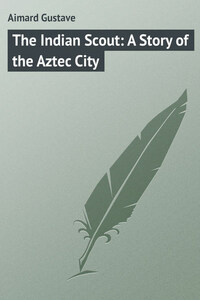It was towards the end of May, 1855, in one of the least visited parts of the immense prairies of the Far West, and at a short distance from the Rio Colorado del Norte, which the Indian tribes of those districts call, in their language so full of imagery, "The endless river with the golden waves."
The night was profoundly dark. The moon, which had proceeded two-thirds of its course, displayed between the lofty branches of the trees her pallid face; and the scanty rays of vacillating light scarce brought out the outlines of the abrupt and stern scenery. There was not a breath in the air, not a star in the sky. A silence of death brooded over the desert – a silence only interrupted, at long intervals, by the sharp barking of the coyotes in search of prey, or the savage miaulings of the panthers and jaguars at the watering place.
During the darkness, the great American savannahs, on which no human sound troubles the majesty of night, assume, beneath the eye of heaven, an imposing splendour, which unconsciously affects the heart of the strongest man, and imbues him involuntarily with a feeling of religious respect.
All at once the closely growing branches of a floripondio were cautiously parted, and in the space thus left appeared the anxious head of a man, whose eyes, flashing like those of a wild beast, darted restless glances in every direction. After a few seconds of perfect immobility, the man of whom we speak left the clump of trees in the midst of which he was concealed, and leaped out on the plain.
Although his bronzed complexion had assumed almost a brick colour, still, from his hunting garb, and, above all, the light colour of his long hair, and his bold, frank, and sharply-marked features, it was easy to recognise in this man one of those daring Canadian wood rangers, whose bold race is daily expiring, and will probably disappear ere long.
He walked a few paces, with the barrel of his rifle thrust forward, and his finger on the trigger, minutely inspecting the thickets and numberless bushes that surrounded him; then, probably reassured by the silence and solitude that – continued to prevail around, he stopped, rested the butt of his rifle on the ground, bent forward, and imitated, with rare perfection, the song of the centzontle, the American nightingale.
Scarce had the last modulation of this song, which was gentle as a love sigh, died away in the air, when a second person bounded forward from the same shrub which had already offered passage to the hunter. It was an Indian; he stationed himself by the Canadian's side, and, after a few seconds' silence, said, affecting a tranquillity probably not responded to by his heart, – "Well?"
"All is calm," the hunter answered. "The Cihuatl can come."
The Indian shook his head.
"Since the rising of the moon, Mahchsi Karehde has been separated from Eglantine; he knows not where she is at this moment."
A kindly smile played round the hunter's lips.
"Eglantine loves my brother," he said, gently. "The little bird that sings in her heart will have led her on the trail of the Chief. Has Mahchsi Karehde forgotten the song with which he called her to his love meetings in the tribe?"
"The Chief has forgotten nothing."
"Let him call her then."
The Indian did not let the invitation be repeated. The cry of the walkon rose in the silence.
At the same moment a rustling was heard in the branches, and a young woman, bounding like a startled fawn, fell panting into the warrior's arms, which were opened to receive her. This pressure was no longer than a flash of lightning; the Chief, doubtlessly ashamed of the tender emotion he had yielded to in the presence of a white man, even though that white man was a friend, coldly repulsed the young female, saying to her, in a voice in which no trace of feeling was visible, "My sister is fatigued, without doubt; no danger menaces her at this moment; she can sleep; the warriors will watch over her."
"Eglantine is a Comanche maid," she answered in a timid voice. "Her heart is strong; she will obey Mahchsi Karehde (the Flying Eagle). Under the protection of so terrible a chief she knows herself in safety."














